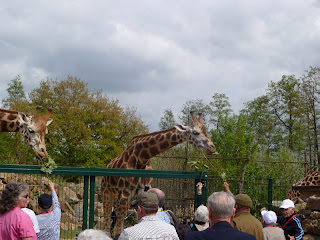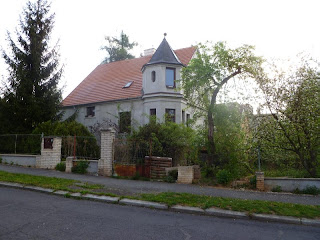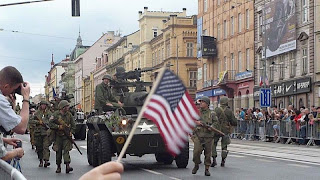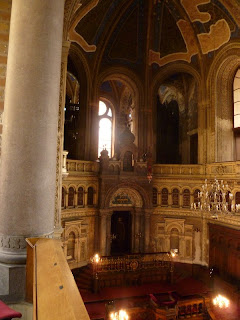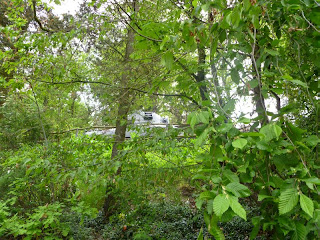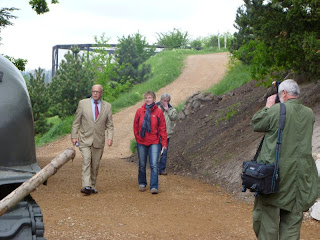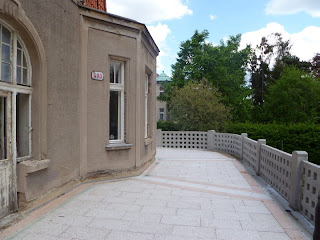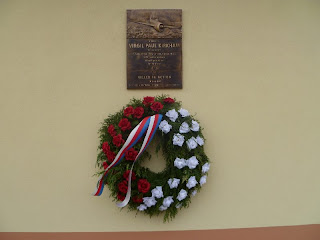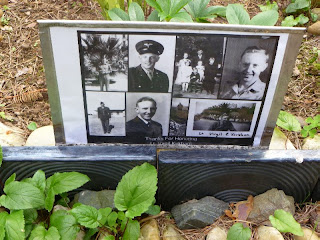2012 Trip to Plzen
Some sage or philosopher can be quoted as the source of the age old saw,
“Each journey begins with but a single step.” (Poetic license)
That quote may have been true in its time and place, but not today.
In America, the trip anywhere in an aircraft begins with the TSA.
There are no
manners and no pleasantries passed between TSA and passengers.
With that off of my chest, I can proceed to things of more import.
The Delta flight from JFK to Prague was as pleasant as any coach flight
across the Atlantic pond can be. Customs and bag pick up were without any drama
and I proceeded to the airport exit.

I had agreed with Jana (pronounced Yana) Poncarova that I would arrive with
my summer motorcycle jacket with all of the patches visible. This worked well.
Jana stood like a lithe angel smiling from a spring of good will bubbling up
like an artesian well from a soul of goodness. This face was not only beautiful
but shone with an open and honest countenance. She stood next to her very tall
husband who, naturally, was a hansom dude befitting the angel next to him. All I
could think of was here was the future of the Czech Republic. Young, eager,
bright, well educated and enthusiastic about their future, the two stood tall
and proud. All I could envision was a halo like one would see in a Greek
Orthodox rendition of the Virgin Mary surrounding the couple. Sappy…perhaps, but
I saw it all and felt the hand of the future. Surly, these folks and millions
like them deserve the opportunity to fulfill the dreams for their future and the
future of the Czech Republic. May a merciful and benevolent creator bring them
the happiness that is their birth right and a promise that they will be blessed
by a body politic wise enough to bequeath them a hope for life, liberty and the
pursuit of happiness.
With this first impression of the Czech future, the couple parted and
revealed the diminutive figure of Marion Kirkham giving me, his now famous,
double thumbs up and a broad smile. How could this trip be anything but great!
Jana and her husband were so differential to Marion seeing to his every need
and showing a respect for the elderly that is now the exception versus the rule
in the US.
It is about an hour’s drive from the airport to Plzen and George Latvicka’s
home. One can not ride through this beautiful country and not be struck by the
number of bright yellow fields that dot the landscape. The yellow plant is the
source of Canola oil that the country uses for the production of bio diesel
fuel. I later learned that the plantings were not because the farmers had a
profitable market for the oil but because there were bureaucratic “experts” in
Brussels who dictated the ratio of specific crops that each farmer could plant.
Clearly the result of the impact of Global Warming teachings forced on the
population. My hope for the Czech Republic took a dip.
We arrived at the Hotel CD.
As I stepped into the lobby, I was transported as if by a time machine to the
Communist era of the 50s and 60s. The hotel was built like a block house with
fixtures Home Depot and Lowes would not sell. But the picture of a socialist
state was made complete by the woman behind the counter who was watching a TV
program in the living quarters behind the check-in desk. We had to call her
twice to get her attention and even then, it was clear that our presence was an
interruption to her TV viewing and she shuffled with reluctance to do her job.
She had no record of my reservation although I had an email confirmation of the
reservation. This dance between her computer screen and her paperwork was a huge
embarrassment to Jana and her husband. I was completely OK with the delay,
initially, but their constant rendering of apologies for the delay was so
distressing that even I became uncomfortable and impatient with the product of a
Stalin era example of…”from each according to his abilities.”
The problem was resolved and Jana and her husband left me to settle into my
room. This took some time.
I am a traveler who is accustomed to sleeping cheap
but this hotel was lacking some of the basic niceties of even a Motel 6. First,
the key was an old skeleton type with a wooden attachment that was as large as a
major league baseball but shaped like a huge tear drop. If I were to put it in
my jeans pocket, I would look like a freak from the Circus trolling for a date.
Consequently, I left the key at the desk instead of carrying it with me. This
was going to be a problem in the future.
I, for one, am not crazy about taking a bath in a tub.
My reason being, the moment you decide to exit the bath water and start to
stand up, there are a dozen ways to slip and fall. My second and real objection
is as you rise, the floating film of soap and dirt that you just washed from
your body is now re-deposited evenly across the entire surface of your skin.
(The Japanese have it right. Scrub the dirt off and rinse sitting on a wooden
stool then get into the clean hot water of an Ofuro deep soaking tub.) In this
tub, the only way the hand held device will reach the top of my head for shampoo
removal is if I am sitting in the tub. Oh well, time to stop my whining and get
clean.
After a "shower", I walked across the street to George Lavicka’s house to
join a party that he was having for all the WWII veterans. George has a large
home that he rents out as a B&B. Part of the home is a covered patio that
includes a storage place for his jeep trailer, a couple of tables and benches,
US Army memorabilia, croaker sacks full of kindling and at least ten cords of
cut and split wood.

The rafters of the cover are littered with more US Army stuff and a license
plate from every state in the Union. Part of this area has a small shed that
encloses one of his proudest possessions, a 40s US Army restored Jeep. It no
longer contains a standard jeep gasoline engine, but that motor has been
replaced by a small diesel engine. In one corner next to the house, George has
fashioned a pyramidal wood smoke oven. The oven is about ten feet high made of
cast iron that has different levels for cooking and smoking. The most commanding
object on the patio is a seven foot (estimated) bronze medallion with a relief
of the European continent with Plzen at the center and elements of Patton’s
Third Army listed around the circumference of the medallion. The medallion is
mounted on the wall of his brick home and I have no idea where George got such a
huge artifact.






Tonight, however, the patio is a place for a party to celebrate the arrival
of all the WWII veterans to his home. I must admit that I was struck by the
scene of a whole pig that had been butchered very recently and had been trimmed
so that there was only the meat worthy of eating that was left on the carcass.
The two halves of the pig were hanging from the rafter of his covered patio and
there was a full time butcher there slicing the meat and boiling it and using
the trimming to make sausage which he ground while we were there and stuffed
washed intestinal casing with the ground pork.
The boiled pork was delicious and the cooked sausage was off the page
delicious. Put three or four kinds of mustard, boiled pork, crisp pickles, head
cheese, smoked sausage and original Plsen beer on the table and you have a grand
start. Add a four piece traditional band and a Czech couple decked out in their
traditional costumes and you have yourself a grand gathering.
Of the five veterans present, one was 90, one 92, one 94 and one 97. All four
went to bed hours after I did. A good time was had by all and George is to be
commended for the effort he put into the gathering.
I awoke the next morning and began the chore of getting ready for the day.
Completing one's morning ablutions requires a different skill set when conducted
in the Hotel CD. Still not fully awake, I completed my morning toilet duties and
then pulled the chain that reached at least ten feet to the top of the tank. I
turned my back to exit the stall and had the BeeJesus scared out me by the roar
of water reaching its terminal velocity as it accelerated down the ten foot fall
pipe and delayed for a three count and then continued its journey to the lower
regions. I have just reread this paragraph and I find it highly unusual that I
would take the time to mention bathroom activities. Most members of a civil
society would not broach such a subject in a public forum, much less commit the
subject to writing. Oh well!
Breakfast was a bit complicated for me. First, I did not have a key to the
house like all of the other guest because I was not residing there. Before I
left the states, it was made clear to me that I would be joining their group for
breakfast each morning. Since each day had some variation as to when breakfast
would start, I would try the previous evening to discover when this might be.
But there was still a big hitch. If one of the vets had a scheduled event that
required him to have an early start, breakfast could start very early in the
morning. Those who did not have an early start could simply sleep in. If I tried
to be at the house when breakfast was scheduled to begin, I would wake up the
entire house with my arrival because I have to ring the security bell to get
through the locked gate that protected the walled compound. It was all very
uncomfortable for me and I dreaded trying to do the right thing for breakfast.


Once I had achieved entry into George's house, the atmosphere was very warm.
Normally, Marilyn, Marion Kirkham's daughter, was ensconced at George's laptop
doing email. There were several coffee carafes with a wonderful blend for taste
and aroma. I can not remember what we had every day because everyday was
different. The first morning was highlighted by canapés left over from the
previous evening. They were beautiful and delicious.

There were fried eggs with fresh pork; pancakes (they were actually crepes);
a pastry morning; and one day with a wonderful soup for breakfast. The vets and
their families would trickle up from the basement rooms and down from the two
floors above. Most seemed to be morning people but demonstrated courtesy and
give each fellow traveler his/her few minutes to come to a full state of
wakefulness.
There were actually only two WW II veterans staying in George's B&B, Eric
Petersen of the 16 Armored Div. and Marion Kirkham who did not make it overseas
but was trained as a pilot. It was his brother, Virgil P. Kirkham that I have
written about and who was killed on 5 May 1945.
Eric was 94 and Marion was 90. These two guys had more energy that they could
summon in a day than I could muster in a week. Both men were effervescent,
gregarious and full of life. To watch them day to day was an honor and a
pleasure.
The weekly routine was normally some activity in the morning followed by a
luncheon presented by some organization in the city of Plzen. If possible, the
guys would take a nap and then make whatever afternoon activity was planned.
Here are some of the things they did: Attended the Czech Republic wreath laying
ceremony for their war dead and resistance fighters; a wreath laying ceremony
for the Czech Republic's aviators who fought in WW II; a wreath laying at the
2nd Infantry Division; a wreath laying ceremony for the 16th Armored; a wreath
laying ceremony at the We Love America monuments; attendance at many of the WW
II field camps that were set up in various parks in the city; participation in
the Liberation Celebration parade of military vehicles; dedication of the
memorial Sherman Tank at the Plzen Zoo and a variety of celebrations in the
nearby countryside. Keep in mind that there were never less than three speeches
made at each of these venues and that each speech had to be translated into
English. There was one gathering in the City Hall where there were at least a
half a dozen speeches that were spoken in Czech or French and then each one of
these was translated into the other language. At no time during the Belgium
ceremony were any of the speeches translated into English. This would test the
veteran's patience.
One of the ceremonies was the dedication of a Sherman Mark 4 tank that had
been through the toughest battle of its life just trying to meet all the red
tape it took to get it into the Czech Republic. Once all the paper work had been
completed, the tank was loaded on a flat bed truck and rolled out toward the
Republic from Germany. As the story goes, the boarder guard/official could not
read the Czech language on the documents and refused to allow the tank to cross
the German/Czech boarder. There was much gnashing of teeth and in the end, Pat
Waters, General George S. Patton's grandson, actually talked to the officials at
the border crossing over the phone and convinced them to allow the tank's
passage.
Pat had picked up some kind of stomach ailment and was not able to attend the
dedication ceremony. This was unfortunate because the dedication was for him,
personally. The tank was recognition for all of the work and resources Pat has
dedicated to the support of the Liberation Day Celebration. We were able to cut
out a piece of the next morning so Pat could visit the Zoo where the tank was
finally placed. See pics of both events.
This is the original ceremony...
This was the second visitation to the dedication site. The man in the tan
suit is Pat Waters and the man with his back to you and wearing an eye patch is
Jiri (George) Lavicka who was responsible for so much work and coordination to
make all of this happen. You can also see George speaking in front of the tank
in the photo above

The highlight, of course, was the parade down their main street. The crowds
were not huge, but they were one or two deep throughout the long parade route. I
must say, the veterans and their families seem to enjoy this part of the visit
and celebration the most. I believe Marion wanted me to participate in the
parade but the organizer did not make plans for the non-veterans and I was not
invited to join the group in the parade. I will admit that I was disappointed
but I had no intention of causing a scene and putting a wet blanket over the
enjoyment of the veterans. I buddied up with some of the wives and family
members who were also not in the parade. We had a front row seat so that we got
to see all of the units. Below is a collage of pictures I took and it is only a
small representation of all the units that participated.
Another part of the celebration is the establishment of military camps spread
throughout the parks in the city. Czechs set up tents, mess halls, sleeping
quarters, first aid tents and equipment displays. All of this "stuff" is
privately owned and the owners look forward each year to show off their
equipment and clothing.

During one of the wreath laying ceremonies, I was standing at the back of the
crowd and happened to look down the street and saw the Jewish Synagogue that
George had shown me two years prior. I separated myself from the assembly and
walked the two blocks to the Synagogue. I paid a stipend and entered the
facility. Below are pictures of the Great Synagogue of Plsen. The corner stone
was laid in 1888 and the structure was completed in 1893. At the time, there
were 1207 Jews living in Plzen. With the Nazi occupation, 2605 Jews were
deported to the concentration camp at Terezin. Only 204 returned. The Great
Synagogue went unused for worship from 1942 to 1998 when major restoration was
accomplished to save the building from the ravages of time. During these years,
the Great Synagogue was used a storage facility and a stables. There were two
large houses on either side of the synagogue and this may be the only reason the
building was not destroyed. I took these pictures for a neighbor and friend,
Jerry Fischer.

The part of town I stayed in had some old but beautiful homes. Most are in
some state of disrepair with some of the owners living in just parts of the
house. It is truly a sad condition, but there is some hope.

As an example, I was invited to visit the home of Barbara and Patrick Foye.
Their home went for years unoccupied and so was vandalized for decades by the
homeless and drug users. Barbara and Patrick are expatriates with two teenage
children from the US. They run some sort of religious mission from their home
and partially justify the cost of the property by using large parts of it for
their mission work. They have built themselves an apartment in what would have
been the attic. It is most unusual because there are so many magnificent support
beams passing through their living space which gives the flat a sort of cubic
architecture look with rooms that transition from one another by two or three
steps going up or down allowing the maximum utilization of the attic space.
There is so much work left to done that it is mind bending. I can not fathom how
they keep a stiff upper lip with a lifetime of work that must be coordinated
through the city of Plzen before any repairs can be made. It was just too much
to absorb. I took a few pictures, but I was so absorbed with Patrick showing me
the entire place and what they had done and what yet remained that I lost
interest in the photos. This is a most unique family with teenagers who I
believe are 16 and 17 and wore their scout uniforms to all of the celebration's
activities. I have never met young men as mature as these teenagers were. They
have a huge bank of knowledge about the world, the Czech Republic and their
homeland. What a pleasure it was to be around them. What I thought I saw were
two young men whose lives were not driven by the materialism we see in the
States and as a consequence, they had more time to learn the issues of the world
and their place in it. May they have the happiness that this kind of life may
bring them.
There was a Mayor's luncheon that I did get invited to and it followed the
recognition of the forces from Belgium that were part of the Allied units that
helped in the liberation of Plsen. This was perhaps the most difficult of all
the ceremonies that I attended. There were approximately ten speeches given and
they were either in Czech or French and then each speech was translated into the
other language from the speaker's language. There was no English spoken. I am
not sure why this was, but I am glad that English was omitted. I can hardly
imagine what it would have been like if we had two translations for each of the
speeches.
The luncheon was very nice except that there was no place to sit when I got
my meal and I ended up on the steps of the City Hall.
In this City Hall, there is a bronze memorial to Patton's Third Army and it
is, in my view, very unique. There is an American Flag with it's staff magically
suspended in space and the folds of the starts and stripes gently gather
themselves into a pillow of red, white and blue that is resting on the top of a
bronze edifice with all the major units that were part of Patton's Third Army
that entered Plsen in May 1945. It is the only bronze structure that I have seen
that was painted. The bronze flag is about and inch to two inches in thickness
and supports it self and the staff in mid air yet gives a feeling of soft fabric
falling gently onto the memorial edifice. The monument is warm in color and in
grace. A befitting recognition of the part the US played in WW II. The collage
below contains the only picture of me in the collection and I am standing next
to the flag monument.

My final and most enjoyable part of the trip was my return to the site were
Lt. Kirkham was killed in May 1945. The trip this time was taken on a most
beautiful day in the Sudetenland. The ride through the country side was filled
with color and the blending of all sorts of patterns and textures.
Once we got into the small town of Ujezd, I saw the first item that was not
here when I first visited Ujezd. It was a small brass plaque on the communitie's
activity center in memory of Lt. Kirkham. (See pic below) We proceeded up the
road to the path leading to the site. The path we chose was the wrong one and we
were a half mile down the two wheel track before we recognized our error. Back
to the car. Drive a click (a thousand meters) further up the road and there it
is. We start off again.
The path is more like an old truckers road used for logging. Once again, I
begin to get that uggy feeling as we approach the site. There are a lot of
memorabilia around the site because of the Liberation Celebration and it makes
the site a little less depressing.
They have built some log benches near by and I take a seat and begin to
ponder. At first, my efforts to see Virgil's memorial site for the first time
was nothing more than a loyal desire to pay my respects to a fellow, if not
fallen, US combat aviator. The experience was so gripping that I was surprised
at how strongly I attached myself to this long fallen combat aviator. This is
not a simple act of projection, I immersed myself in the details of his last
flight and the history and culture of the people of the Czech Republic during
1945.
I no longer trust my own motives. I am sitting here at my computer at 0430
staring at the screen reaching inside myself for an explanation of the reasons
why I care about this entire subject. In part, I was most surprised at the
response that my original story generated and had my ego stroked by many of the
comments from those who had read the story. Secondly, I was willingly drawn into
this group by the friendship shown to me and my friend, Dick Ward, by Marion
Kirkham. Nothing would make me happier than to be able to call Marion a friend.
I felt a genuine desire to be with him as his friend at the celebration when he
invited me.
Up until now, I have missed the point. The Liberation Celebration is about
the people of Plzen and the US veterans whose lives and personal histories were
changed forever by their deployment to Europe. This is their time, their history
and their memories. My time, my history and my memories are of another generation and
suitable for another day. I can only rejoice in the adoration laid at the feet
of these old soldiers.
I am here for Virgil.
I am reminded that my connection to Virgil is identical to my connections to
the veterans of our two current wars. We have become a nation at war with two
nations but the war is felt by only a few and the rest of us have no skin in
this game. I am, personally embarrassed that less than one half of one percent
of our population of 303 million are members of the armed forces or are even
aware of the sacrifices endured by our service personnel and their families.
The
United States is not at war. The all volunteer Army, Navy, Air Force, Marines
and Coasties are at war.
If our leaders lack the vision and fortitude to recognize the error of our
ways, then let us declare that we will say a remembrance, a prayer, if you like,
for the safe return of every trooper in harms way. Our history has enough
stories like Virgil's.
I would like to thank the Foye family, George Latvicka his wife Lidus and
Jana Poncarova and her husband for going out of their way to make my stay as
comfortable as possible. I hope that Jana will find the voice to critique my
thoughts on Eastern European Democracies.





























































































